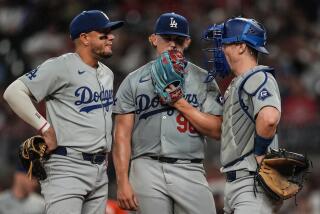Braves Try to Plug Holes With Trade
- Share via
In the week of the trade deadline, the Atlanta Braves lost catcher Javier Lopez to knee surgery and left-handed pitcher Odalis Perez to elbow surgery for the rest of the season.
First baseman Andres Galarraga, who is being treated for cancer, and reliever Kerry Ligtenberg, who had elbow surgery, had already gone down.
With the New York Mets threatening the Braves’ dominance in the East and problems with both his offense and vaunted pitching, General Manager John Schuerholz, who is normally looking to fill a fringe need at the deadline, was hopeful of addressing one or more gaping holes.
“The fact that we have four key players unavailable to us not only impacts how we perform but our bargaining depth as well,” Schuerholz said.
Ultimately, he beat the deadline by minutes on Saturday. He sent Micah Bowie, one of his top pitching prospects, and two minor league players to the Chicago Cubs for versatile infielder Jose Hernandez and veteran left-hander Terry Mulholland, who figures to replace Perez in a rotation in which the tenuous nature of John Smoltz’s elbow and the inconsistency of rookie left-hander Bruce Chen had compounded the injury to Perez.
The acquisition of Mulholland, who can also relieve, gives the Braves six potential starters and adds depth to an inconsistent bullpen.
The loss of Lopez on top of that of Galarraga, meanwhile, had created a crater in the middle of the batting order that the acquisition of Greg Myers from the San Diego Padres earlier in the week didn’t figure to fill.
Schuerholz had tried to address the power void by dealing for a first baseman such as Will Clark of Baltimore or former Brave Fred McGriff of Tampa Bay but, foiled in that endeavor, he turned to Plan B, which called for keeping Ryan Klesko at first base and acquiring a table-setter in the leadoff or No. 2 spot in the batting order.
The Braves have tried five different players, including Walt Weiss, Otis Nixon and Ozzie Guillen, in the leadoff role without success. The offense entered the weekend ranked 10th in the league in team batting, with a modest average of 4.8 runs a game. Hernandez doesn’t represent the power of a Clark or McGriff, but his .272 average and 15 home runs are better than the revolving door that the Braves have operated at the top of the order.
It didn’t take the departure of Hernandez to document that the Chicago Cubs’ wild-card magic has dissolved, leaving manager Jim Riggleman’s status in doubt again.
Riggleman is signed through next year and has received votes of confidence from club President Andy MacPhail and General Manager Ed Lynch, but he is walking a tightrope for the third consecutive year.
“I can’t tell plumbers how to fix a sink or electricians how to get power,” he said. “I can’t tell lawyers how to run a case, but [fans and media] can criticize me because everybody thinks they know baseball.
“I know what we are as a ballclub and where I stand as a manager. I have confidence in myself, but you have to win. To have the security that Tony La Russa, Jim Leyland and Bobby Cox have, you have to have a track record of winning. I don’t have it, so I completely understand my vulnerability.”
Sammy Sosa’s development, despite the Cubs’ disappointing season, has allowed him to produce another spectacular campaign. He is batting .307 with 93 runs batted in and a league-leading 40 homers--one more than Mark McGwire, his partner in last year’s great chase.
“Everybody knows that in [the home run] department, it’s pretty much going to be Mark and I,” Sosa said. “This year feels good, but there isn’t the excitement of last year. After all, we were trying to break a record that was there for 37 years. If it happens again, there’s going to be a lot to talk about.”
More to Read
Go beyond the scoreboard
Get the latest on L.A.'s teams in the daily Sports Report newsletter.
You may occasionally receive promotional content from the Los Angeles Times.










